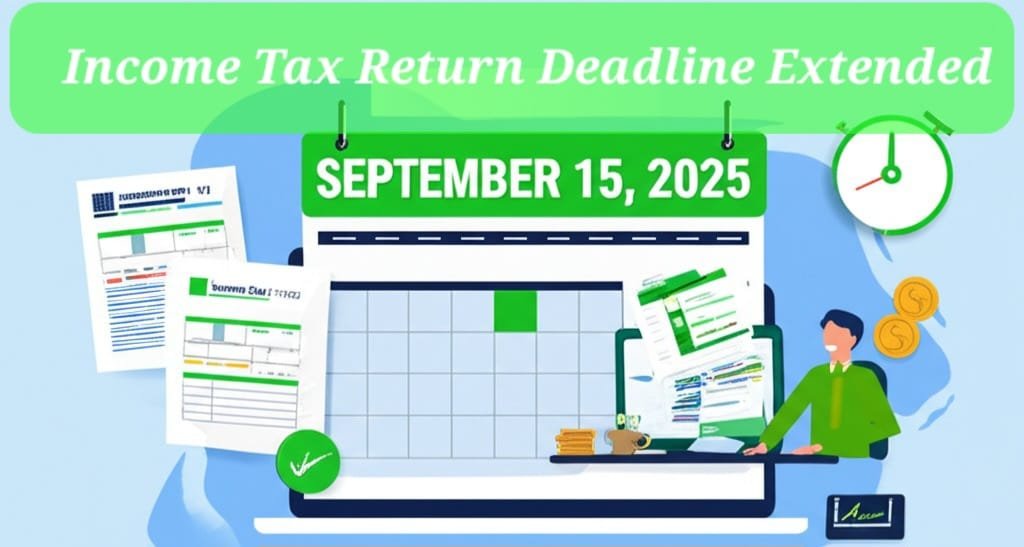Table of Contents
ToggleIncome Tax Return Deadline Extended: A Relief for Taxpayers Till September 15, 2025
The government has announced a much-needed extension for filing Income Tax Returns (ITRs) for Assessment Year (AY) 2025-26. The deadline, originally July 31, 2025, has now been extended to September 15, 2025, offering taxpayers extra time to organize their finances and file accurately. This move aims to reduce last-minute hassles and ensure smoother compliance.
Below, we break down the reasons behind this extension, its benefits, and actionable steps to file your ITR efficiently.

Why Was the Income Tax Return Deadline Extended?
The Income Tax Return Deadline Extended decision comes as a relief for taxpayers and professionals alike. Key reasons include:
- Reducing Last-Minute Rush: Prevents portal crashes and filing errors due to heavy traffic in July.
- Simplifying Compliance: More time for taxpayers with complex incomes (e.g., capital gains, foreign assets).
- Encouraging Accuracy: Fewer errors mean fewer notices from the IT Department.
- Supporting Tax Professionals: CAs and consultants can manage workloads better.
Key Benefits of the Extended Deadline
✅ More Time for Documentation: Gather Form 16, investment proofs, and deductions without stress.
✅ Avoiding Penalties: No late fees under Section 234F if filed by September 15.
✅ Better Financial Planning: Review records thoroughly before submission.
✅ Smoother E-filing: Reduced portal traffic = fewer technical glitches.
Who Benefits from the Extension?
The Income Tax Return Deadline Extended helps:
- Salaried Employees: Verify Form 16 and claim deductions (HRA, 80C).
- Freelancers & Business Owners: Reconcile income/expenses accurately.
- Senior Citizens & NRIs: Extra time for complex filings.
Steps to File Your ITR Before September 15, 2025
1. Gather Documents
Form 16, bank statements, investment proofs (PPF, ELSS), and capital gains reports.
2. Choose the Right ITR Form
ITR-1 (Sahaj): Salaried income under ₹50L. ITR-2/3/4: For business/Capital gains.
3. Verify Pre-filled Data
Cross-check auto-filled salary, TDS, and interest details.
4. Claim Deductions
Maximize 80C (₹1.5L), 80D (health insurance), and HRA benefits.
Consequences of Missing the Deadline
⚠ Late Fee: ₹5,000 (₹1,000 if income < ₹5L) under Section 234F.
⚠ Interest on Pending Tax: 1% monthly under Section 234A.
⚠ Loss Carry-forward: Restricted if returns are unfiled.
Final Thoughts: Act Early, Avoid Stress!
The Income Tax Return Deadline Extended to September 15, 2025, is a golden opportunity to file accurately and avoid penalties. Use the extra time to organize documents, verify deductions, and submit your ITR without last-minute chaos.
Need help with filing? Ask your questions in the comments below!
Frequently Asked Questions
Q1: Is the ITR deadline extension applicable to all taxpayers?
Yes, the extension to September 15, 2025 applies to all individual taxpayers, businesses, and professionals filing ITR-1 through ITR-7. However, advance tax payment deadlines remain unchanged.
Q2: Will I still need to pay advance tax by the original deadlines?
Important: The extension only applies to ITR filing. Advance tax installments (June 15, Sept 15, etc.) must still be paid as per original schedule to avoid interest under Section 234C.
Q3: Can I revise my return after September 15 if I make a mistake?
Yes, you can file a revised return until December 31, 2025 (or before assessment completion). Note that the initial return must be filed by Sept 15 to avoid late fees.
Q4: Does the extension apply to audit cases (ITR-5/6/7)?
No. Businesses requiring tax audits must still meet the original September 30, 2025 deadline. The extension only applies to non-audit cases (ITR-1 to ITR-4).
Q5: How do I check if my ITR is successfully filed?
After submission:
1. Look for "ITR Processed" email/SMS from IT Department
2. Log in to the e-filing portal > View Returns
3. Verify status shows "Verified and Processed"
Q6: What if I miss the September 15 extended deadline?
Late filing attracts:
• ₹5,000 penalty (₹1,000 if income < ₹5L)
• 1% monthly interest on unpaid tax
• Losses (e.g., house property) cannot be carried forward

